Key takeaways
Many law firms are hesitant to adopt groundbreaking legal technology due to cost, implementation hurdles, and compliance concerns.
AI is rapidly evolving and can help law firms with everything from client communication to research and document drafting. Failing to leverage innovative tools could cause firms to fall behind competitors.
Greater use of cloud-computing software can make it easier for law firms to collaborate across team members and departments.
Improved legal analytics helps law firms make better data-driven decisions.
It’s understandable if you feel anxious about adopting and investing in new legal technology. Some firms may believe the effort and costs of implementing new technology are too risky. It can also be hard to find solutions that adhere to legal ethics rules and IOLTA compliance.
While law firms are traditionally hesitant to embrace legal technology, recent trends show that the firms that do invest are seeing real benefits. According to our 2025 Legal Industry Report, 65% of law firms said that generative AI tools save one to five hours a week. And the experts’ predictions support this:
In this article, we’ll share the law firm technology trends for 2026 that deserve your attention and explain why adopting them is not only wise but also necessary for your firm.
1. Legal AI is rapidly evolving
AI is one of the most dominant trends in legal technology today, and law firms are quickly adopting it to support many tasks. From simplifying complex workflows to automating more mundane administrative work, AI offers law firms many opportunities to improve profitability through time savings.
How AI legal tech can help your law firm:
Improving operational efficiency: AI and similar tech can speed up or completely automate tedious tasks like time tracking and document generation. This efficiency frees up time, allowing you to focus resources on tasks that provide more value to your clients and your firm.
Diversifying your legal clientele: As AI reduces a law firm’s costs, offering legal services at a lower price for lower-income clients becomes more feasible.
Sending faster responses to clients: Our 2025 Legal Industry Report found that drafting correspondence was the most common task lawyers used AI tools to complete. Responding quickly to clients can help build trust and create a smoother experience.
Providing chatbot support for clients: AI chatbots are another tool that provides 24/7 support to clients and leads alike with answers to common queries.
Increasing accessibility through AI glasses: These glasses still have some time to go before they’re widely adopted, but they represent an exciting development for legal professionals. AI glasses could provide real-time transcription or translation services, allowing lawyers to break down language barriers. They could also provide support for lawyers with disabilities, making it easier for them to do their jobs and better serve their clients.
Considerations for AI in law firms
While AI has endless possibilities, responsible adoption is key. Before investing in AI tools, law firms need to consider the following:
Enhance AI proficiency at your law firm: Allocate training time to help your staff learn how to use AI, streamline their workflows, and ensure compliance.
Obtain input from key stakeholders: Successful implementation depends on your team's feedback and buy-in. With their insights, you can choose the right software for your firm’s needs.
Reliability and accuracy: AI is not fallible; there have been some high-profile cases where lawyers have used ChatGPT or other generative AI tools for a deposition, only for it to have fatal flaws. Any time a lawyer uses an AI tool, they will need to fact-check and proofread the documentation for accuracy.
Ethical considerations: Lawyers have a moral duty of competence. ABA Model Rule 1.1 requires lawyers to exercise the “legal knowledge, skill, thoroughness, and preparation reasonably necessary for the representation.” Attorneys who use AI will need to understand the technology well enough to use it responsibly in accordance with professional conduct rules.
Maintaining human oversight: Technology cannot replace a lawyer’s professional judgment. Due diligence is always needed before submitting documents to a court, whether drafted by a generative AI tool or an associate.

2. Law firms are investing in legal tech to reduce administrative loads
One of the main goals of using legal tech is to reduce time spent on administrative tasks that, while necessary, don’t contribute to growth. Tools that accelerate or eliminate these tasks immediately open up more time in an attorney’s calendar to spend on billable work.
These capabilities also help reduce human error, especially with time-consuming tasks like invoicing and correspondence. Greater accuracy and faster turnaround also improve the overall client experience and can help resolve cases faster.
A great starting point is to have AI-powered tools handle routine, database-driven client communication tasks, like:
Providing court dates or case status updates
Explaining basic procedural next steps through an AI-powered chat or messaging tool
Adaptive questionnaires that adjust questions based on the client’s answers
These use cases are low-risk but high-impact: They reduce administrative burden while giving clients 24/7 access to accurate information at their convenience.
Considerations for investment in legal technology
Legal technology can help you achieve better outcomes, improve customer experience, and enhance your overall profitability as you run your firm.
However, here are some questions you can ask to help reduce the risk of investing in legal tech solutions:
Does the technology solve a problem at my firm?
Will the technology contribute to future growth?
Is the platform easy to use, and can it scale with my firm?
Does the solution integrate with the tools I already use?
Will the legal technology solutions adhere to the ethical requirements mandated by my state bar association?
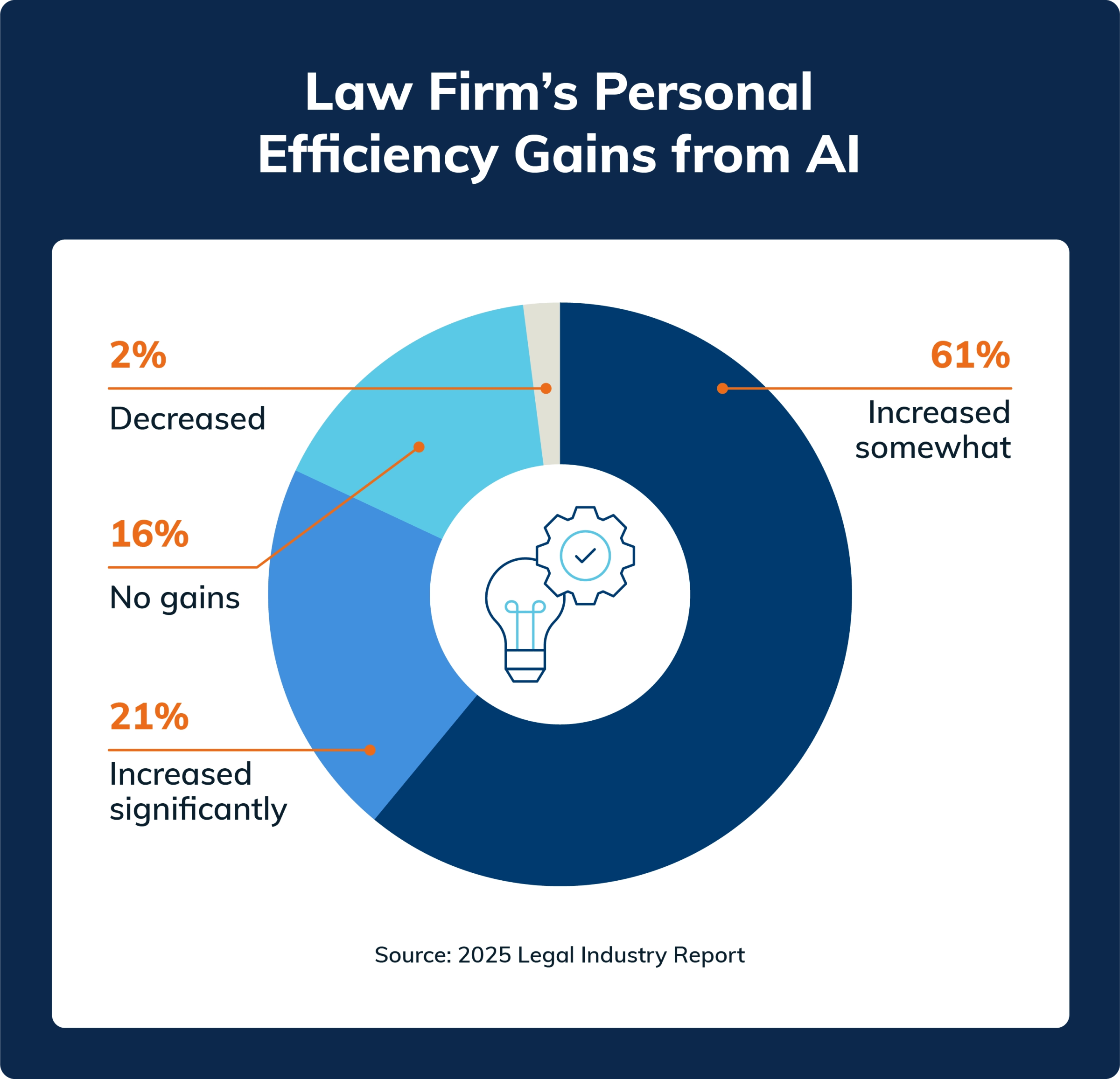
3. Legal analytics and operational insights are expanding
Law firms today have access to more real-time data than ever before.
For example, you can use generative AI interfaces to easily access your firm's entire data set of matter information, financial metrics, and documents. These insights can help you make faster, accurate data-driven decisions that produce positive results for the firm.
From a day-to-day standpoint, improved legal analytics and operational insights will enable the following applications for law firms:
Data-driven case strategy: Analyzing whether a judge has previously been more sympathetic to plaintiffs or the defense can help lawyers anticipate motions and craft strong arguments.
Advanced financial tracking: Advanced financial tracking helps you evaluate the types of cases and clients that are the most profitable.
Client insights: You can build customized dashboards to see high-level information on case timelines, cost, outcomes, and trends to help your staff anticipate needs and give more strategic guidance.
Operational benchmarking: Advanced legal analytics can support benchmarking strategies that measure how well your firm is performing against your focus competitors. You can also use benchmarking tools internally to see which attorneys are performing at the highest level.
Considerations for law firm analytics
Legal analytics tools can offer law firms powerful insights when appropriately used. Lawyers who want to increase their access to analytics can consider the following:
Provide accurate data to ensure you receive high-quality analysis. This may require integrating other tools into your AI-powered platform to sync data in real time.
Use secure tools and storage methods to protect sensitive information and client privacy, especially when feeding large amounts of data into an analytics tool.
Invest in initial and ongoing data analysis training to ensure your staff can collect the right insights from your data.
Prioritize analytics software that integrates with your practice management software. Centralized information can help prevent data silo issues across your firm and ensure a more comprehensive and accurate analysis.
4. Blockchain and smart contracts are on the rise
Blockchain technology and smart contracts are two types of legal technology reshaping how legal agreements are created and recorded.
Blockchain refers to a decentralized ledger that provides a record of transactions and enables self-executing contracts (smart contracts) that reduce the need for intermediaries.
The terms of a smart contract are written into its code, and the contract automatically executes the actions once those pre-established terms are met. This technology has several key features that make it attractive to law firms:
High transparency allows all parties to see identical data.
Strong security makes it nearly impossible to tamper with encrypted data within the blockchain.
Immutable data restricts others from altering transaction data after it is posted without the consent of all parties.
Faster authentication helps users verify and authenticate legal documents without a notary.
Accelerated compliance reviews produce streamlined compliance checks, leading to faster resolutions.
Considerations for blockchain and smart contracts
As law firms ramp up their use of blockchain and smart contract technologies, there are several factors that they must consider:
Jurisdictional differences: Blockchain and smart contracts are cutting-edge technologies that lawmakers and regulators have not yet caught up with. When using a smart contract, check if the terms are enforceable under local contract law.
Regulatory uncertainty: The regulations around blockchain and smart contracts are in flux. It will be helpful to regularly monitor your jurisdiction’s laws and regulations to ensure you remain compliant.
Cybersecurity threats: As more information is digitized, the consequences of a data breach or cybersecurity threat only grow. Invest in adequate measures to safeguard sensitive information and digital assets handled on the blockchain.
5. Remote working tools grow in adoption
While many companies have worked to bring their workers back to the office since the COVID-19 pandemic began, many have embraced remote or hybrid work environments.
Law firms have largely embraced remote working tools, allowing them to develop talented teams not confined to a single geography. Consider the following data from our 2025 Legal Industry Report:
76% of legal organizations reported adopting cloud-based remote working technologies
The most commonly adopted remote working tools are video conferencing (79%), e-signature (78%), and e-filing (76%). These tools highlight the importance of enabling remote collaboration and document management.
The use of cloud-based financial tools increased from 50 to 69% in just two years.
While attorneys have generally embraced law firm technology to foster greater collaboration and efficiency, they still have concerns. In our 2025 Legal Industry Report, law firms highlighted the worries they are looking to mitigate:
Data privacy and confidentiality issues
Cybersecurity
Disengaged workforce
Inability to provide adequate supervision
Reduced productivity
Technology failures leading to downtime
Lack of access to necessary information
Despite these real challenges, law firms recognize the importance of adopting remote work technology. Most (66%) respondents say that remote work technology is a part of their long-term strategic business continuity plan.
Considerations for remote working tools in law firms
Before fully embracing remote work, consider reviewing the legal and operational considerations affecting how leadership manages its organization. These factors include:
Data protection: Thoroughly vetting technology providers hosting and storing the law firm’s data helps protect confidential client data. This duty includes understanding how the data will be handled, where the servers on which it will be stored are located, and who will have access to the information.
Technology infrastructure: Depending on the size of your law firm, you might consider hiring IT professionals or contracting with a trusted firm that understands the unique situations working within highly regulated industries.
Maintain your firm’s culture: Remote work can make it tough to maintain a strong company culture and keep your staff feeling connected. This can lead to turnover and a drop in performance and efficiency. To help prevent this, you could implement regular check-ins and remote-friendly communication tools to encourage better collaboration.
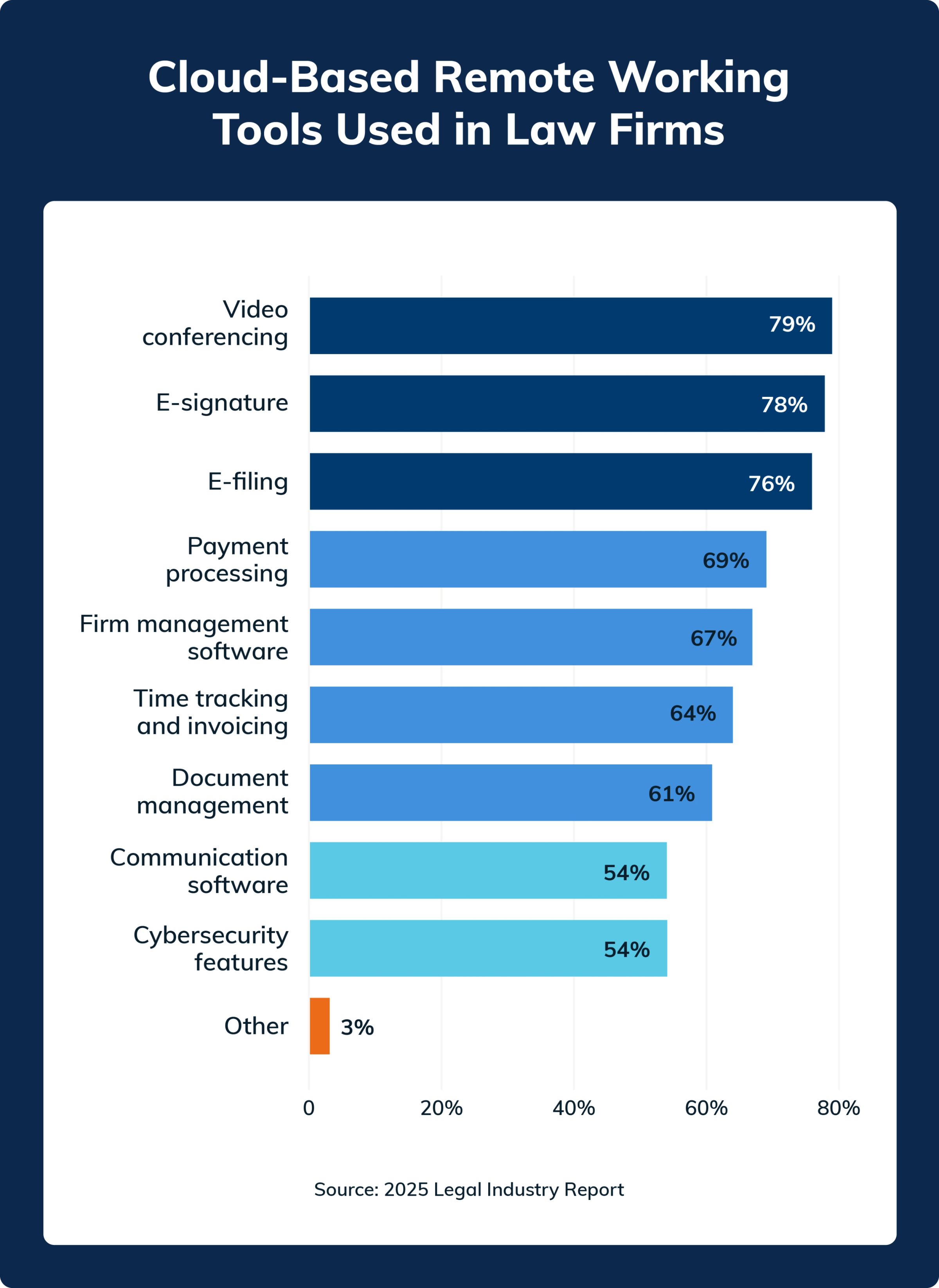
6. Cybersecurity is evolving into a competitive advantage
Seemingly every year, high-profile data breaches jeopardize the reputation of companies that put their customers’ sensitive information at risk. Clients today expect any business with their data to keep it safe, creating an even higher bar for law firms.
Law firms without cybersecurity protections on par with financial or medical institutions will likely be at a disadvantage to firms that implement and market them.
Greater cybersecurity adoption also supports law firms looking to build a global workforce. As companies turn to cloud-based software and other remote work tools, cybersecurity technology helps keep the firm’s and clients’ information secure.
In fact, 54% of law firms that use cloud-based technology leverage cybersecurity features, like:
Multi-factor authentication: An additional layer of security that requires users to verify their identity on two or more devices.
Zero-trust security: Software will assume every user and device is not trusted. Validation is continuously validated to reduce the risk of breaches.
Data encryption: Data encryption is the process of encoding sensitive information. Encrypted data is unreadable for a hacker unless they have the encryption key.
Considerations for cybersecurity for law firms
Because of the sensitivity of the data your firm stores, it’s essential to have high standards when choosing cybersecurity tools. These considerations include:
Possesses core security features, including multi-factor authentication, zero-trust architecture, and proactive threat detection.
Adheres to compliance requirements provided by the ABA and your state bar association.
Integrates with existing solutions, especially your practice management, correspondence, and billing solutions.
Easy to incorporate into your regular processes while providing minimal disruption to your team.
7. Billing is proactive and strategic
Innovative legal tech is helping to transform billing into a proactive and strategic function that delivers real benefits for law firms, like speeding up collections.
For example, legal billing software that includes automated payment reminders can reduce administrative lift, keep clients on track, and significantly improve invoice collection rates. The result is faster payments and less stress for everyone involved.
Modern billing platforms can also create a better client experience. Client portals provide real-time visibility into their case status, hours you’ve worked, and fees they’ve accrued. This information keeps the client informed throughout the process while minimizing risks of billing disputes later.
For law firms engaging in longer-term business planning, AI tools can assist in predicting how long cases will take, what resources the firm will need to invest in, and how much it will cost to service a client. These predictions can come early, allowing attorneys to clearly communicate cost expectations with clients.
Considerations for legal billing and AI solutions
When implementing AI solutions into your billing processes, consider:
Ethical challenges: It will be important to establish clear guidelines for charging the client. Generally, time saved by automation or spent on internal AI training is not billable to clients.
Accuracy oversight: Pair AI tools with regular human oversight to ensure clients receive accurate bills. For example, assign a staff member to review all timesheets before submitting them for AI-powered invoice generation.
Auditability: Find solutions that simplify tracing and reviewing AI-generated outputs, like invoices, so you can easily answer client questions or meet regulatory requirements.
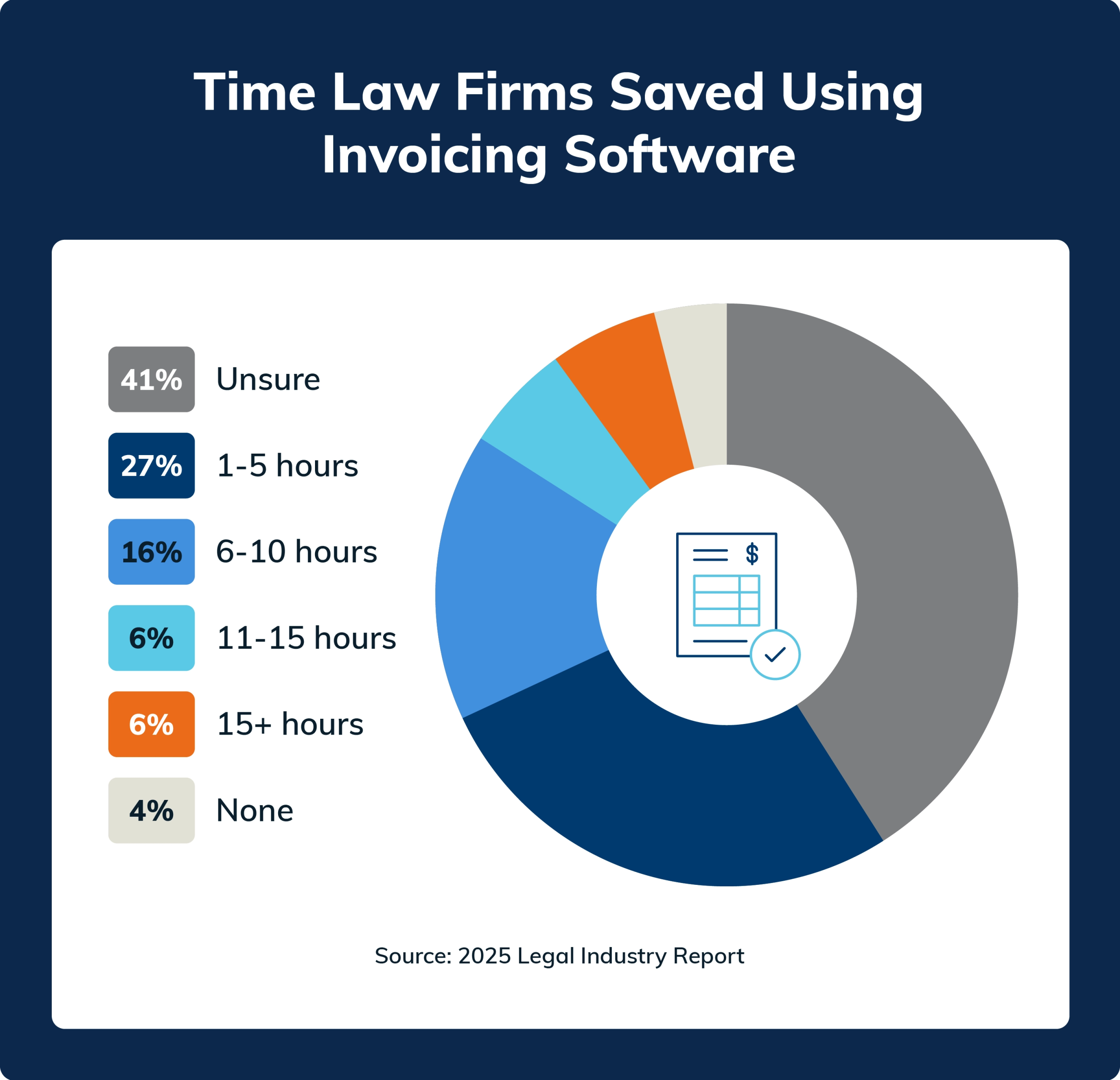
8. New law firm specialties are emerging
New technologies lead to the creation of new products, new assets, and new laws. To better serve clients experiencing resulting disputes, new legal practice areas are filling this void in the legal market.
One such area is metaverse law. This area examines virtual worlds' unique issues, including NFTs, avatars, and virtual contracts and currencies. Part of this world crosses into more established practice areas like trademark and copyright law, while other elements involving jurisdictional disputes and privacy are more groundbreaking.
Some law firms, such as AI native firms, are built from the ground up around AI technology. Rather than law firms incorporating AI tools into existing workflows and processes, AI native firms are designed to leverage AI capabilities in every part of their law firm.
Considerations for emerging law firm specialties
Law firms considering branching out or specializing in these emerging areas should consider the following:
Determine the need: As these emergent technologies start to grow, lawyers can ask what issues require a solution, and which they will serve. The answers to these questions will help firms determine whether there is enough volume to support the practice area today.
Regulatory uncertainty: Emerging areas have unclear laws, and the legal landscape around these areas will likely change significantly over the next decade. Flexibility will be key for law firms.
Competitive landscape: Some of these areas are dominated by boutique firms specializing in a specific niche. Before entering the new market, take a step back to consider how you will enter and compete against more established firms.
Invest in talent: It’s unlikely that your current team will have adequate expertise to navigate these issues. Law firms can prepare to work to attract, hire, and retain key talent in these areas.
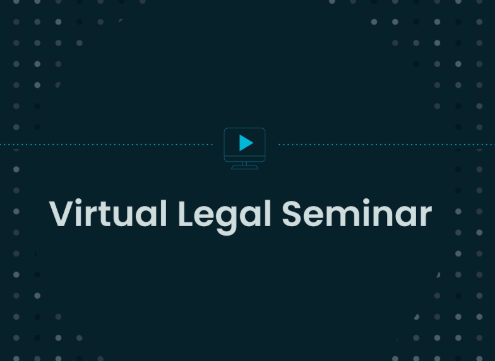
Stay ahead of legal technology trends with 8am™ LawPay
When looking at law firm technology trends, one thing is certain: change is inevitable. When assessing legal tech trends, honestly evaluate your strengths and weaknesses and choose innovations that will meaningfully make a difference.
Ultimately, by leveraging solutions that are specifically designed to meet the challenges legal professionals face, you can help future-proof your firm against whatever is coming next. This is why leading legal professionals across the country are using solutions like LawPay to deliver exceptional client experiences and modernize their operations.
Sign up with LawPay today to learn how to easily implement modern billing and online payments for your firm.
Schedule a demo to see what LawPay can offer your firm.
Get a demo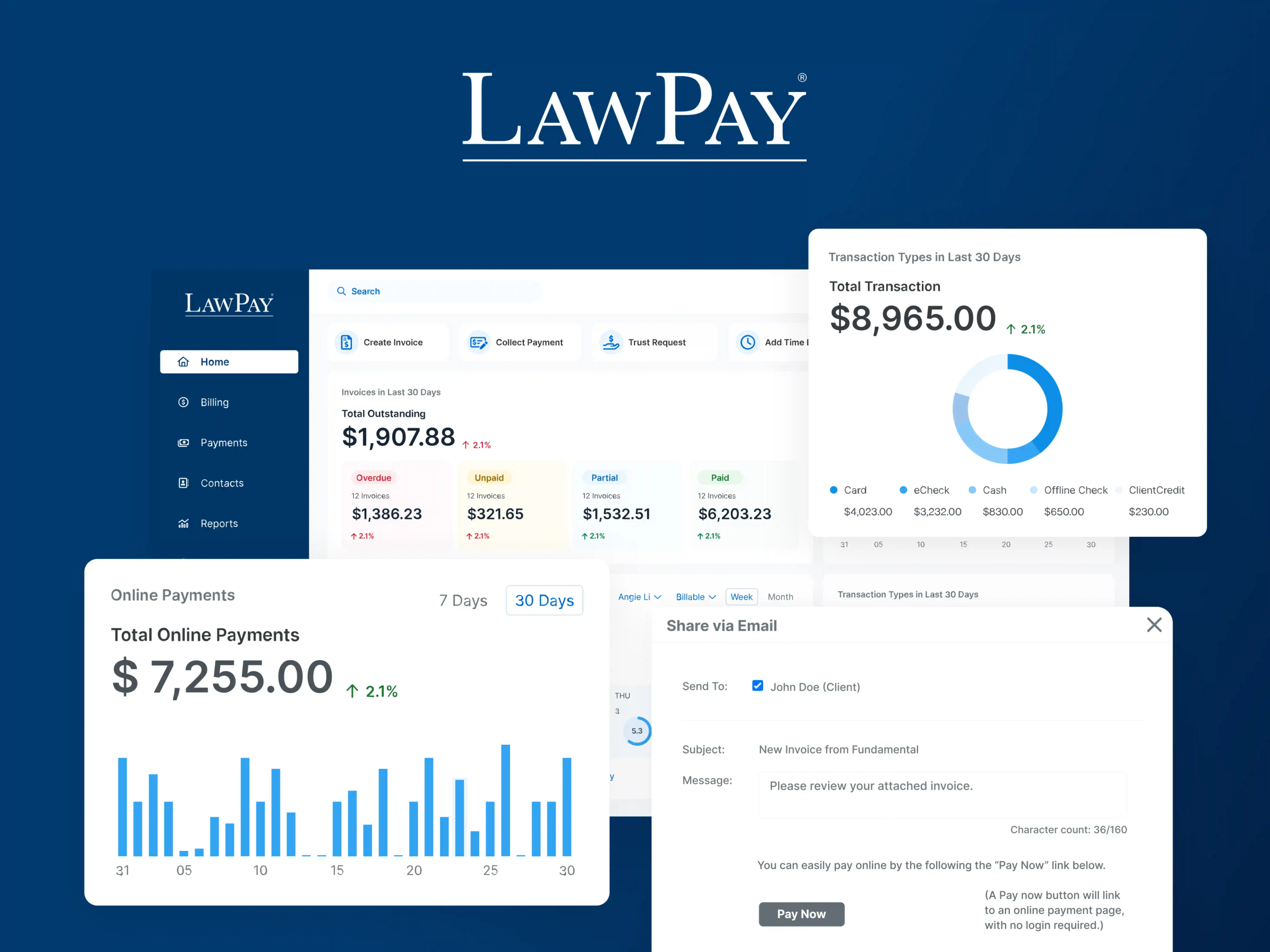
About the author

Adrian AguileraContributing author
Adrian Aguilera is a Senior Content Writer and SEO Strategist for 8am, a leading professional business platform. With over a decade of experience, he covers emerging legal technology, financial reporting for law firms, accounting, the latest industry trends, and more.
